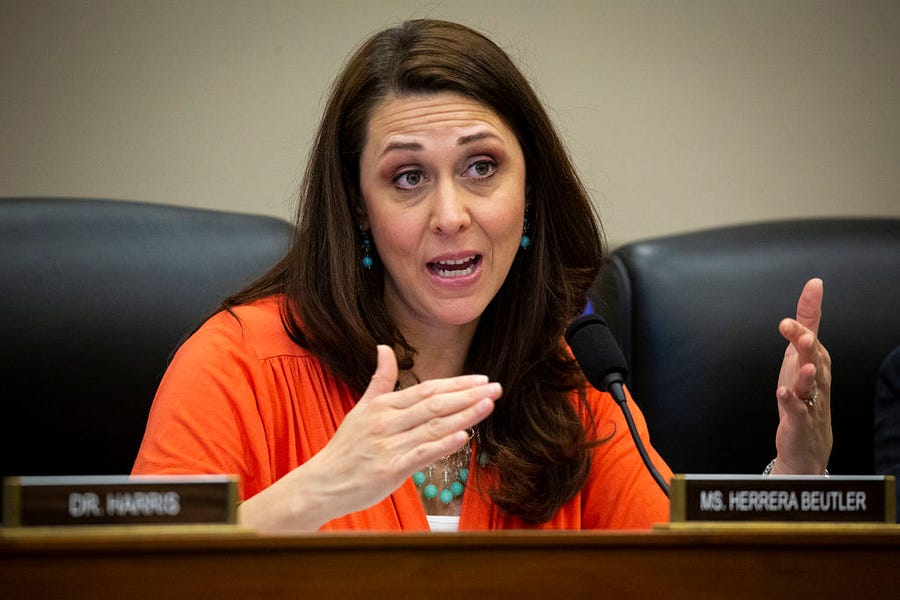Good morning.
Jaime Herrera Beutler’s Fight for Another Term
My colleague Harvest has an in-depth profile on Rep. Jaime Herrera Beutler on the website this morning. You can read the full piece here. Below are a few key moments from Harvest’s interview with Herrera Beutler, a Washington state Republican who voted to impeach former President Donald Trump after the January 6 attack on the Capitol.
She remembers January 6 vividly.
In an interview with The Dispatch, Herrera Beutler recounts evacuating the House floor as rioters broke down barricades and fought their way into the Capitol. After holing up in Washington Rep. Cathy McMorris Rodgers’ office, she decided to try to get back to where her staff waited in her own office.
Down one hallway, she ran into two Capitol Police officers who “had had the total shit beat out of them.” After a pause, Herrera Beutler adds: “Excuse my language, but that was it. They were kind of limping and walking, and they were dazed, and they had bear spray on their faces.”
“Has Donald Trump said anything yet?” she says she asked them. “Has he gotten on TV? Has he called anything off?”
No, they told her.
“It was just a moment of total clarity,” she tells me.
Herrera Beutler understands the GOP is sharply divided on Trump’s actions and his culpability. But she stands by her vote for impeachment.
“In terms of responsibility, if you’re a mile from the House, or from anywhere, and there’s a massive riot taking place and you don’t, as the commander in chief, try to stop it?” she says. “To me, the counting of Electoral Ballots is the Constitution in process. … And if you aren’t willing to stop an attack on that, irrespective of your party, irrespective of everything, then it’s a dereliction of your duty.”
She believes Democrats’ decision to end the Senate trial before calling witnesses was a “shame.”
“What I learned from that was nobody really wanted to do the work of investigating,” Herrera Beutler reflects in our conversation. “My big takeaway was, oh, you want to impeach him if you can make political points out of it. But if you really want to do the work of then telling the American people the why and showing them the why on TV, with Republicans asking questions and Democrats asking questions and letting the American people truly judge—you don’t want to do it. That was a shame to me.”
House impeachment managers briefly considered bringing Herrera Beutler forward as a witness to shed light on a conversation between House GOP Leader Kevin McCarthy and Trump on January 6, during which Herrera Beutler says McCarthy urged Trump to call off the rioters and Trump responded, “Well, Kevin, I guess these people are more upset about the election than you are.”
Herrera Beutler tells Harvest that the call spoke to where Trump’s “frame of mind was” during the hours the Capitol was overrun, factoring into her impeachment vote.
Herrera Beutler is hoping her attention to local issues and her approach to governance will overcome conservative backlash at home.
She’s uninterested in a style of lawmaking that is flashy or power-seeking. She describes faith as a driving motivation and seeks to stay grounded to the daily issues her constituents face.
“I feel accountable to a higher power. I feel accountable to the people I serve, but I also personally know I’m responsible for doing this to the best of my ability,” she says. “God cares about people. He tells us to care and love people. That’s what I bring to this job.”
She’s tried to foster an office culture focused on service. “Our casework services and our constituent services are very solid, and the team knows their goal isn’t to be somebody climbing in an office that’s going to go into leadership and be important in DC and make a lot of TV news,” she adds. “It’s when somebody calls and is in a desperate situation, a federal agency is standing between them and their housing—which has happened—we’re going to go to bat for them.”
Read the rest of the profile here.
Bill to Watch
When COVID-19 hit two years ago, the United States was not prepared for a deadly, easily transmissible disease that quickly became pandemic.
The response was beset with shortages of critical medical supplies, such as ventilators and personal protective equipment for health professionals. Medical staff faced harrowing experiences during surges of the coronavirus, and many became burned out and overwhelmed.
False information online, muddled communication from government officials, and former President Donald Trump’s adamant downplaying of the virus despite knowing better made it hard for Americans to keep up with the facts. Tests were hard to obtain throughout the pandemic, making it difficult for people to use them in advance of gatherings or to check what was causing their symptoms. The list goes on.
A sweeping, bipartisan bill introduced by the top members on the Senate health committee last week seeks to remedy many of these problems and shore up America’s ability to respond to health threats.
Members of the Health, Education, Labor, and Pensions (HELP) Committee are meeting this morning to mark up the legislation. You can watch the hearing here.
HELP Chair Sen. Patty Murray crafted the bill alongside the top Republican on the committee, Sen. Richard Burr. It would create an evenly divided independent task force to investigate the coronavirus response. It would also require Centers for Disease Control (CDC) directors to be Senate-approved, a change Republicans have sought for months to boost accountability for the role.
The CDC would also have to draft comprehensive strategic plans every four years. The Department of Health and Human Services (HHS) would likewise have to submit an annual report to Congress on the state of public health preparedness. It includes new requirements for HHS to examine its public information efforts. The bill would also create an office of pandemic preparedness and response policy within the White House, which would lead interdepartmental coordination and advise the president.
Also included is a pilot program to assist several states in building up strategic health supply stockpiles.
A section-by-section summary of the legislation is available here. Details of the package are likely to change before coming to the Senate floor, but it has good odds of advancing given its high-profile sponsors.
If You Missed It
I wrote for The Dispatch’s culture section over the weekend about a recent book, The Impossible City, which memorializes Hong Kong as it was before Beijing’s brutal crackdown on freedom in the city. You can read the review here.
On the Floor
House members are expected to vote on legislation to end permanent normal trade relations with Russia this week. (You can read more background on that in last Friday’s Uphill.)
The House is also set to vote on legislation this week to ban discrimination on the basis of an individual’s hair texture or style if it is associated with a particular race. A full list of bills the House is slated to consider this week is available here.
The Senate will proceed with a confirmation vote this week for Shalanda Young to lead the Office of Management and Budget. Young, a former senior congressional staffer, has been leading the agency in an acting capacity since early in the Biden administration.
Key Hearings
-
The Senate Foreign Relations Committee is meeting for a hearing this morning on combating authoritarianism. Information and livestream here.
-
The House Administration Committee will hold a hearing Wednesday afternoon to discuss potential stock trading reforms for Congress. Information and livestream here.
-
Members of the House Foreign Affairs Committee on Wednesday will examine signs of war crimes and human rights abuses by the Russian military in Ukraine. Information and livestream here.
-
The head of the U.S. Forest Service will testify before the House Oversight and Reform environment subcommittee on Wednesday morning during a hearing on combating wildfires. Information and livestream here.
-
The House Homeland Security Committee will hold a hearing Thursday morning on violence against black institutions. Information and livestream here.
-
The Senate Banking, Housing, and Urban Affairs Committee will meet for a hearing Thursday morning on the role of digital assets in illicit finance. Information and livestream here.






Please note that we at The Dispatch hold ourselves, our work, and our commenters to a higher standard than other places on the internet. We welcome comments that foster genuine debate or discussion—including comments critical of us or our work—but responses that include ad hominem attacks on fellow Dispatch members or are intended to stoke fear and anger may be moderated.
With your membership, you only have the ability to comment on The Morning Dispatch articles. Consider upgrading to join the conversation everywhere.